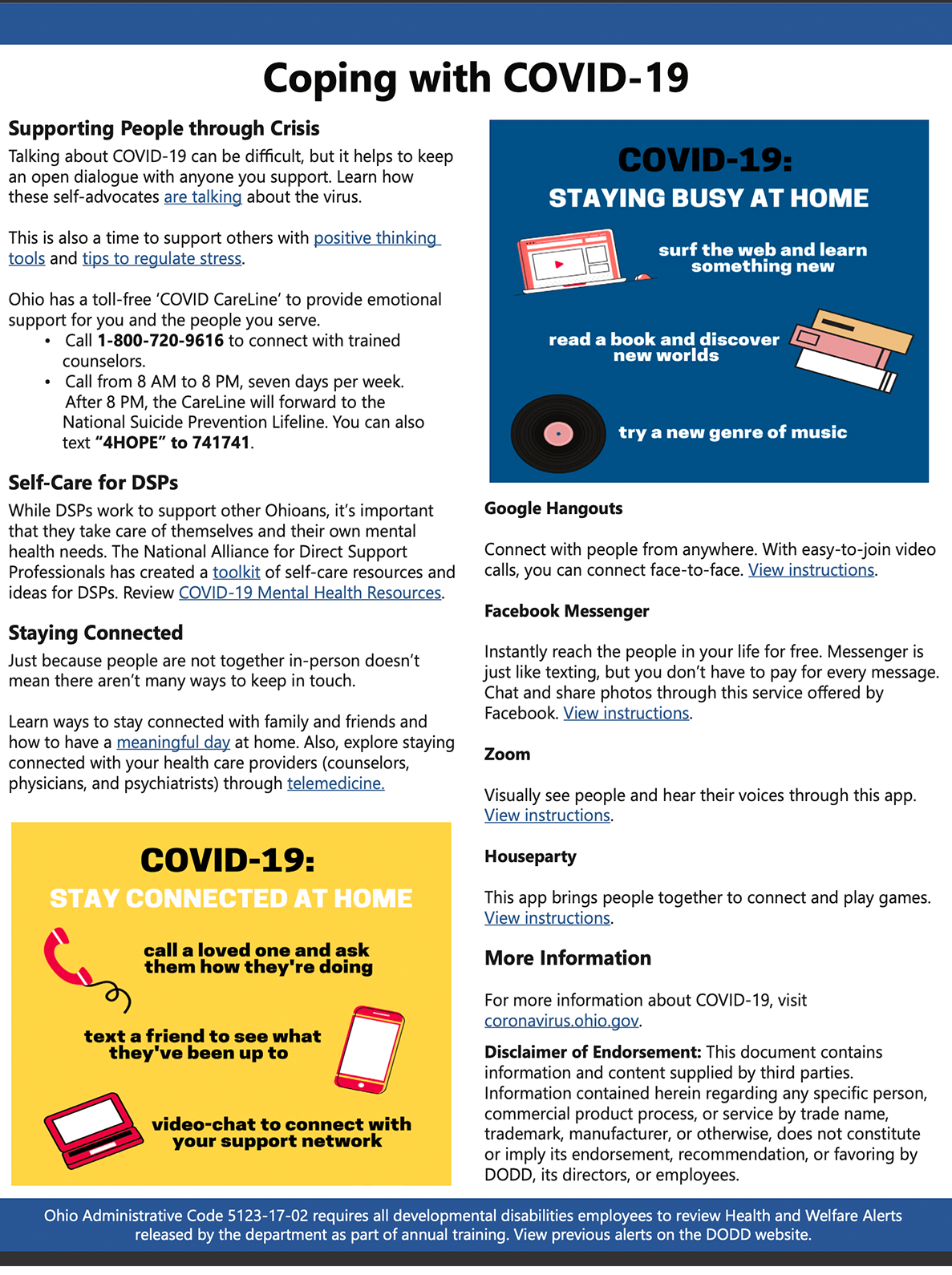Community Living Experiences, Inc. takes the safety of our consumers as top priority and continues to monitor the daily updates from CDC.

In the event that workshops and day programs are closed due to the current concern of COVID-19, CLE will be taking the necessary steps to ensure that all consumers are still being provided with services. With that being stated, if CLE experiences a major staffing shortage, CLE may combine some site (not all) together to ensure staffing is provided to all consumers. This is simply a precautionary measure that CLE has prepared in response to the closure of workshops, day programs, schools, and some child daycares, which could affect some staff being able to work scheduled shifts. As of now, CLE’s plan of action to ensure we are managing appointments, visitations, cleaning supplies, food supplies, medical/medication supplies, activities, and overall health/safety of our consumers are as follows:
Cleanliness: CLE is requiring all persons (including staff, consumers, and visitors) entering the home to wash their hands immediately.
- Consumers-are required to wash their hands after every restroom break, before meals, after meals, routine hygiene (showering in the a.m. and p.m.), discarding soiled laundry properly and washing hands immediately after
- Staff-are required to wash hands upon entering home working scheduled shifts, disinfect all knobs (doors, stovetop knobs, washer knobs, dryer knobs), rails/ grab bars, disinfect all surfaces (counter tops, cabinets, and tables), disinfect public areas (bathrooms in the home, family areas: front room/dining area)
Visitation: CLE is taking the necessary preventative measures concerning COVID-19. CLE will be monitoring family and friend’s visitation at the homes/sites of our consumers. CLE will be keeping track (sign in/out sheet) of who visits our consumers and are requesting one visitor at a time per home for 60 minutes per visitation.
Appointments: If consumers have upcoming scheduled appointments, CLE will contact the physician/ doctor’s office to inquire about rescheduling consumers appointments (unless appointment is critical or immediately necessary). I will provide you with updates if rescheduling does occur.
Community Activities: CLE will do short community outings such as trips to parks (as long as: weather permits, parks are not heavily populated, and meet age restrictions). CLE will refrain from attending heavily populated community outings/activities.
Medical Supplies: CLE consumers are currently receiving all medical supplies through auto-fill. CLE is currently remaining in close contact with all pharmacies that our consumers receive their medication through.
Household Supplies: CLE sites are stocked with disinfectant cleaning supplies (sanitizer, Lysol, bleach, rubbing alcohol, disinfectant wipes, and disposable gloves) as well as other household goods (tissue, paper towel, detergent, hygiene products, etc.) We are making all efforts to keep some cleaning supplies in the home as long as they are available to us.
Food Supplies: All CLE sites have been stocked with food supplies (non-perishable food items, frozen food items, fresh food items, water). CLE site coordinators will be checking with sites weekly to ensure that all homes stay replenished with all food supply items.
Activities: CLE have provided sites with several in-home activities specified to the consumers liking: arts and crafts, card games, quilting, baking, exercise videos, coloring books, paper plate art, shaving cream art, planting equipment (seeds, flower pots), and any other requests from our consumers CLE will provide the materials.
CLE will provide you with weekly updates to keep everyone abreast of any new developments or changes (if any). Please let me know if you have any questions or concerns.
Guidance: COVID-19 Standards of Care for Vulnerable Populations
May 06, 2020 | DODD
In response to input received from Ohioans with developmental disabilities and their families, the Ohio Department of Developmental Disabilities, the Ohio Department of Health, and the Ohio Department of Medicaid collaborated to create this guidance about standards of care for vulnerable populations in hospital settings.
Hospitals and clinicians play a significant role in protecting the most vulnerable Ohioans as they are charged with making important decisions around treatment for patients. This becomes particularly challenging when health care systems face surges and scarce medical resources. As part of the coronavirus (COVID-19) response, hospitals must have crisis standards of care and resource allocation guidelines in place, and medical professionals must be well-informed about how to implement these protocols. All hospitals should ensure that their policies align with legislation and best practice, particularly around issues concerning vulnerable populations.
- Patients must be informed of their rights and be included in decision-making about their care. Crisis standards of care and scarce resource allocation protocols should be transparent, accessible, and made available. Documents should be easy to read and accessible to the populations served (i.e., multilingual, plain language, Braille, etc.).
- Systems and medical professionals cannot use disability status, pre-existing medical conditions, race, ethnicity, age, or quality of life perceptions as factors for determining or deprioritizing treatment or allocation of resources for a person or group of people.
- Decisions around care and allocation of resources must be based upon individualized clinical assessment and the patient’s survivability from COVID-19 and should be made in concert with the hospital’s ethics committee.
- A family member or caregiver (i.e., patient care assistant, direct support professional, etc.) should be allowed bedside access for patients who normally require assistance with activities of daily living. In situations where this is not possible or that pose a significant barrier to infection control, alternate arrangements should be made to meet the patient’s unique needs. A caregiver’s active role is essential to the patient’s health outcomes.
- Telemedicine should be considered, where appropriate, to facilitate continuity of care while implementing social distancing measures. Delivery of telemedicine services should incorporate appropriate accommodations to meet the unique needs of each patient.
- The U.S. Department of Health and Human Services (HHS) Office of Civil Rights (OCR) enforces the Americans with Disabilities Act, Section 504 of the Rehabilitation Act, the Age Discrimination Act, and Section 1557 of the Affordable Care Act which prohibits discrimination in HHS-funded health programs or activities. As such, people with disabilities should not be denied medical care based on stereotypes, quality of life, or judgments about a person’s relative “worth” based on the presence or absence of disabilities or age. Decisions by covered entities concerning whether a person is a candidate for treatment should be guided by an individualized assessment of the patient and his or her circumstances, based on the best available objective medical evidence.
May 2020, DODD Covid-19 Health and Welfare Alert update


